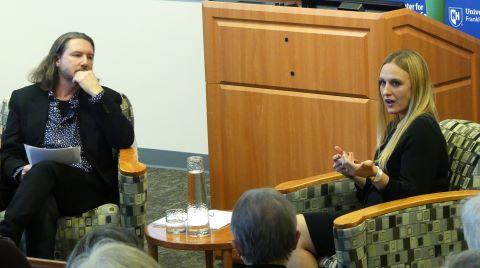NPR Correspondent Sarah McCammon: Nuanced Views on Abortion More Common than Political Tug of War Suggests
NPR correspondent Sarah McCammon covers political, social, and cultural divides in America and the intersection of politics and religion as it affects such issues as abortion. McCammon discussed her beat during a Justice & Journalism event at the UNH Franklin Pierce School of Law with NHPR host Rick Ganley and Rudman Center Director of Engagement Laura Knoy.
The Justice & Journalism series of annual events is a joint initiative of New Hampshire Public Radio and the Warren B. Rudman Center for Justice, Leadership & Public Service.

NHPR host Rick Ganley interviews NPR Correspondent Sarah McCammon during Justice & Journalism event, a joint initiative of New Hampshire Public Radio and the Warren B. Rudman Center for Justice, Leadership & Public Policy.
Answering questions also from the audience, McCammon delved into her coverage of abortion. (Visit here to listen to the full conversation. Quotes in this piece have been edited slightly for clarity. Visit here for Sarah McCammon’s up-to-date reporting on the issues discussed during this March 30 event.)
McCammon explained why she uses certain terms in her reporting on the subject, following guidelines established by NPR editors. “Words are really important and being accurate and precise and as neutral as possible is really important, particularly with an issue like this,” she said.
“We talk about supporters or opponents of abortion rights. We don’t say pro-life or pro-choice. Those are both kind of murky terms,” she said. “Because you support abortion rights doesn’t necessarily mean you support abortion. You might have a moral opinion based on your religion that it’s not a great decision, but you think it should be someone else’s choice and so therefore you should have the right to choose.”
Nuanced positions get lost in the political fray
As divisive as the abortion debate seems in this country, particularly in the political arena where the battle has intensified, McCammon said, her one-on-one conversations often reveal a different reality.
“The American people do have fairly nuanced views, and complex views, about abortion, and when you sit down and talk with people, many people do express complicated feelings about abortion, whether they’re for or against it in terms of public policy,” she said.
“If you look at public opinion there is an existing appetite for compromise but between the way many legislatures have been gerrymandered and the way that the courts have been stacked with conservative judges, the policies often don’t reflect that appetite.”
There is also variation among religious groups when it comes to abortion, she said, though conservative Christian groups have been especially vocal and have received much of the attention. “There isn’t one religious narrative about this question. And I think for many people it does invoke a lot of religious, philosophical, or moral questions about what you think about when life begins, and what you think about the relative value or importance of the fetus vs. an adult person,” she said.
“I’ve seen more and more of alternative religious voices, progressive religious voices trying to speak more loudly and, in some cases, to litigate and challenge state laws and say, ‘this is actually an affront to our religious beliefs because our religion says something different.’”
Since the U.S. Supreme Court overturned Roe V. Wade, removing the federal constitutional right to choose an abortion, support for abortion rights has increased, McCammon said, “as people have seen these laws take effect and what they actually mean in practicality. It’s no longer hypothetical; it’s reality.”
What remains to be seen, she suggested, is how intensely abortion-rights groups will push back and whether they will begin to recognize the importance of the judiciary.
“I think the Christian right understood early on the importance of the Supreme Court, the importance of the Senate, which confirms Supreme Court justices, the importance of the federal judiciary in general and state legislatures as well,” she said. “And they organized around that, and they organized really effectively. They organized based on deeply held beliefs. That’s why I think this movement has had so much power -- is that the rank and file have deeply held beliefs about the way the world should be and the way that God wants the world to be.”
“But I think that those who disagree with those beliefs see that vision of American society as far too narrow and not aligned with the Constitution, which allows for freedom of belief, freedom of religion. I think it remains to be seen if the left will be able to organize in the same way. I think we’re seeing some efforts to that end,” she said. “We’ve seen it in the blue wave in post-Trump elections; we’ve seen it to some degree in this last midterm election where in every state where abortion was on the ballot, voters essentially voted to support abortion rights and oppose more restrictions.”
“There is an ideological tug of war and whoever understands it the best, and is the most strategic, is going to win.”